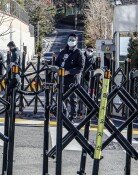US asks S. Korea to issue joint restrictions on China's semiconductors
US asks S. Korea to issue joint restrictions on China's semiconductors
Posted October. 15, 2022 07:24,
Updated October. 15, 2022 07:24
It has been reported that U.S. President Joe Biden tried to persuade South Korea, Japan, and European allies to issue export controls against Chinese semiconductors, only leaving them hesitant to join.
“With China, the administration spent months in discussions with allies, including the Dutch, Japanese, South Korean, Israeli, and British governments, and tried to persuade some of them to issue restrictions alongside the United States,” reported The New York Times on Thursday (local time). “But some of those governments have been hesitant to cut off important commerce with China, one of the world’s largest technology markets. So the Biden administration decided to act alone, without public measures from allies.” The United States stressed that it aims to impose restrictions on Chinese exports alongside its allies just as the West works jointly to keep Russia at bay following its invasion of Ukraine. However, as it was met with some countries’ hesitance to join, the U.S. original initiative fell through.
Last Friday, the U.S. administration announced a set of export regulations not only on any cutting-edge semiconductors used in Chinese supercomputers and AI systems but also on memory semiconductor equipment, including system semiconductors of 14 nm and below, DRAM of 18 nm and below and 128-Gbit NAND chips.
According to reports, Washington requested that Seoul should work to take export control measures against China. At the same time, the two allies discussed the exemption of Samsung Electronics and SK Hynix from the U.S. export control of semiconductors. In response, it reportedly argued that joining export regulation will not bring any practical benefits considering that no South Korean business sells semiconductors to China in the supercomputer and AI markets, which are the main target of a series of regulations in progress.
Nevertheless, it is highly likely that Washington will consistently request its allies including Seoul make it clear to put export regulations in place given that the U.S. National Security Strategy issued on Wednesday includes measures to strengthen regulation on China’s export of technologies.
On Thursday, the U.S. Federal Communications Commission said it would adopt a resolution to ban approvals of communications equipment manufactured by Huawei and ZTE across the country. If and when this resolution passes, the two Chinese tech firms will not be able to sell any communications equipment in the U.S. market.
weappon@donga.com







